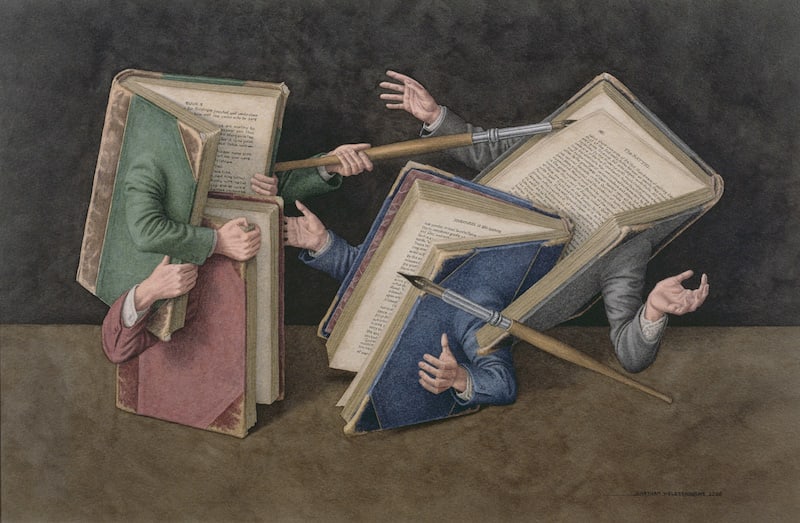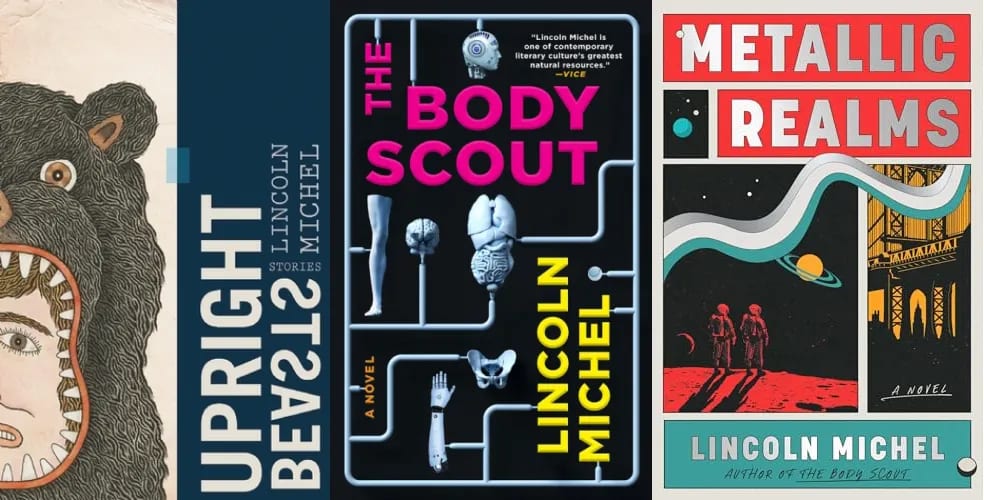In personal news, my new novel Metallic Realms was just named one of the 9 best books of the year (so far) by Vox! I’m quite honored to be in such elite company. I was also interviewed about the novel for the Los Angeles Public Library. If you haven’t picked up a copy of Metallic Realms yet, well, there’s no time like the present.
I was traveling last week, and so was spared from writing a long response to David Brooks’s “When Novels Mattered” article. The piece rehashes, in a far lazier and less persuasive form, the viral article from Owen Yingling that I responded to here. I recommend Yingling’s piece, but would skip Brooks’s. I did notice Brooks’s article contained basic errors and hinged on the factually inaccurate claim that “no work of literary fiction has been on the Publishers Weekly yearly top 10 sellers list since [Franzen in] 2001.” In fact, a bunch have appeared after 2001 including Franzen himself. Brooks then shoehorns in his usual shtick that “social pressure and conformity” from “liberals” and the “left-wing” have ruined everything.
The article reads like a DavidBrooksGPT output, combining meaningless phrases like “raw social courage” with hallucinated facts. One gets the impression Brooks hasn’t read many (or perhaps any) contemporary novels, but he also seems unfamiliar with the classics cited. While complaining that the left-wing ruined literature, he laments that literature’s “center of gravity moved from Greenwich Village”—the legendary hub of authors like James Baldwin and Allen Ginsberg who championed civil rights, LGBTQ rights, socialism, and anti-war activism. (On this topic, if the left and progressives are the problem then one wonders why the decline is most notable when conservative media—including magazines and publishers—are better funded and more influential than ever before?)
Mainly what his article made me think about wasn’t the decline of literature but of mainstream newspaper opinion sections. While original thought was always rare in newspaper op-eds, there was a time when such pieces instantiated conversations. Now, they rehash Substack articles weeks later without doing any fact-checking or research. No wonder journalists are abandoning ship for Substack…
But his piece did make me want to comment one last time on this topic with a few points I wish I’d made or elaborated on.
If I’m going to chide David Brooks for lazy arguments, I should admit an error, or at least an omission, of my own. I stand by my claims in “The Forever Dying and the Always Dead; or, Literary Fiction and the Novel.” But I’ve been bothered by how I failed to mention a salient fact to the whole “Has literary fiction been dying or not dying since the 1970s?” debate: “literary fiction” didn’t exist before the 1980s.
Here, I have to credit Dan Sinykin (author of the excellent Big Fiction) who laid out the case in The Nation a few years ago:
“Literary fiction” made only a handful of appearances throughout the history of Publishers Weekly, and just seven in The New York Times before 1980. Fiction was simply “fiction” unless it fell within a small set of categories: mystery, romance, science-fiction, the western. Fantasy and horror were just then congealing into genre categories in their own right. In a 1976 interview with Publishers Weekly, Marc Jaffe, the editorial director of Bantam Books, used “‘literary’ fiction” to distinguish titles that weren’t commercial or genre fiction, though he felt the need to put scare quotes around the word “literary” and added the caveat “for lack of a better term.”
Basically, in response to some of the market forces I described in my piece, writers and publishers of what we now call literary fiction began using that term to distinguish themselves. I’ve always argued genres are historical and cultural. As Sinykin says, our modern concepts of fantasy and horror also cohered around this time. So I’m not arguing literary fiction is any more or less fake than other genres. “Literary Fiction” retroactively has claimed writers that predate the term, much in the same way other genres do. Jane Austen wouldn’t recognize her Novels of Manner as “Romance” and Mary Shelley didn’t consider her Gothic works as “Science Fiction”. (That’s probably a topic for another newsletter.) Anyway, the fact that literary fiction cohered as a concept after the 1970s makes it somewhat nonsensical to argue about whether it did or didn’t decline post-1970s. How can it decline before it exists?
If “what counts as literary fiction?” is a fraught question for books published before 1980, it is also fraught in the decades since. The term might have been coined to refer to uncommercial, challenging fiction…but once it became marketable the scope crept. As I pointed out in my piece (and Sinykin also points out in his), writers like Delia Owens, E.L. James, and Paulo Coelho are counted as Literary Fiction by BISACS and BookScan.
As long as I’m rambling again on this subject, it has struck me that a lot of the takes seem driven by cognitive dissonance caused by 1) the writer believing that popularity is a literary virtue and 2) thinking the books that are currently popular are bad. They like X, but modern readers prefer Y and Z. How is it the books that should be popular aren’t in fact popular? And why are the books that shouldn’t be popular selling so many copies? To resolve this, they come up with (sometimes elaborate) theories for how modern readers are being tricked into buying what they buy.
This is hardly limited to literary fiction discourse. A similar cognitive dissonance drove the Sad/Rabid Puppies affair in Science Fiction. The puppies argued that “popular fiction” authors such as (surprise) themselves were being unfairly overlooked in favor of what we’d now call “woke” books…. even though those woke authors often sold more books and so were literally more popular.
Since you can’t blame the readers if you’re coming from a popularist position, you have to assume their taste is inauthentic. You must blame either “the gatekeepers” (editors, agents, critics, awards committees, etc.) or the writers themselves. To make the first argument, you have to grapple with the fact that gatekeepers have never had less influence than they do today. Professional reviews and prestigious awards have never mattered less for sales, and the rise of the internet and self-publishing has allowed writers to circumvent gatekeepers altogether—indeed the big publishers spend significant time and money recruiting authors from the fan fic and self-publishing worlds. The gatekeepers are publishing the authors who get popular without gatekeepers.
That leaves authors themselves as the source of literature’s ails. Writers are simply worse than decades past—they lack “raw social courage” or whatnot—or else they’ve en masse become unwilling to write books that are simultaneously popular and good. Yet there have likely never been more writers in general or in the vague category of “literary fiction.” MFA programs, SFF classes, commercial fiction online writing courses, private manuscript consultations, and so on are big businesses. Even if 99.9% of these authors are bad, surely some must be great. Between self-publishing, non-profit indie publishers, and the Big 5, several million books a year are published in America. How can it be that no one is writing and publishing the “good books” (however defined)? The math doesn’t quite make sense.
This is why my argument centered on questions of distribution, discoverability, and larger cultural shifts. I’d say that (more or less) you can find any type of book you want today. But the kind of books that were bestsellers in the 80s and 90s—when books were largely distributed and purchased at grocery stores, big box stores, and large bookstore chains—are different from the kind of books that are bestsellers today when Amazon dominates the marketplace and the New York Times Book Review sells far fewer books than booktok. It isn’t the quality of work per se, but the changes in distribution, discoverability, and readership.
While I don’t expect to change anyone’s minds, I’ll still suggest that any account of the decline of literary fiction and/or literature in general needs to at least grapple with the following facts:
It seems undeniable—and as far as I can tell uncontested—that the shift to more commercial work being described in literature also happened in film, music, etc. Is the shift in the bestseller list any different than the shift from a box office once topped by Kubrick and Coppola to one entirely dominated by interchangeable superhero films and endless franchise reboots and reimaginings? It is true to say that serious literary fiction authors are no longer the cultural figures they once were. They aren’t culturally ubiquitous figures appearing frequently on magazine covers and popular TV shows. But can’t the same be said of serious visual artists, public intellectuals, and any other part of what was once called “high culture”?
This decline in the status of “serious art” and “high culture” (or whatever you want to call it) and the corresponding dominance of mass market entertainment is something everyone seems to agree on. Some cheer it, some decry it. But it has happened. Any critique about literature’s decline I think needs to tangle with this culture-wide shift. It isn’t university creative writing classes causing the box office to be dominated by interchangeable franchise action films. It isn’t “liberal white women in publishing” who are responsible for the declining cultural status of painters or the ascending popularity of low-quality reality TV shows. Maybe it’s some combination of social media, cell phones, and corporate conglomeration? Maybe you have another idea. But you need an explanation that covers more than books.
It is also undeniable that gatekeepers have less influence today than at any other point in at least the last hundred years. That doesn’t mean they have no influence. But the ability of legacy media, prestige awards, professional critics, and the like to shape sales has dramatically declined in the last 20 years. We now live in the social media age, and a viral TikTok will sell far more copies than a New Yorker rave.
The evidence is easily seen in the PW top 10 bestsellers list that was the center of the Brooks’s piece. If you look at the top sellers so far this decade, the most obvious trend is the dominance of “viral” books. Authors like Colleen Hoover, Rebecca Yarros, and Sarah J. Maas gained popularity not through mainstream coverage much less snobby critics. They got famous through social media. Few in the mainstream media or the literary world had even heard of Colleen Hoover until suddenly she was topping bestseller lists. “Romantasy” went from a term no one used to the buzziest sales category thanks to Rebecca Yarros. Yarros is published by the independent publisher Entangled whose CEO brags about not letting “writers write whatever they want” and tailoring books to “TikTok hashtags.” Even the more literary bestsellers, like Madeline Miller’s The Song of Achilles (#9 in 2021), owe much of their sales to social media. Miller’s novel was published in 2011. It became a bestseller a decade later thanks to booktok virality.
Booktok itself seems to be declining in influence. But publishers still invest tons of resources into recruiting authors who go viral in fan fiction circles, self-publishing, and social media. Literary fiction imprints and artistically inclined genre imprints still exist, but they are not most of publishing. NYT reviews and Pulitzer awards can still sell books, but they are no longer able to ensure bestseller status, if they ever did.
I’d never argue publishing is a meritocracy. Connections, luck, and money go a long way in every part of the book biz (as in every part of America). This includes the “gatekeeper free” areas. Self-publishing is warped by who can spend money on marketing or successfully rig the algorithm through smart publicity or even purchasing fake reviews. There is no neutral field. That said, we should assume that the bestsellers are bestsellers because lots of readers enjoy those kinds of books.
This is true whether we’re talking about commercial-minded bestsellers like Yarros and James Patterson or the literary fiction bestsellers. Recently, I was talking to someone who told me the problem with literary fiction today was that everything was a dense postmodern book no real readers enjoyed. I asked what titles they were thinking of and they responded with Ocean Vuong and Jonathan Franzen. Now, neither of those authors is “postmodern” or notably dense in my book. (Franzen famously wrote a whole essay about how his work stood in contrast to dense postmodern authors.) Regardless of descriptors, these are two massively popular authors. Vuong has sold over a million copies. Franzen has twice had a top 10 seller this century.
That level of success is not something that can be manufactured by critics or “literary snobs.” I don’t know how many literary readers exist who pay close attention to critics and awards. One number floated around—related to Christian Loretnzen by the Editor-in-Chief of an independent literary press—is 20,000. That number is of “serious and consistent” readers, and so the accuracy would depends on your definitions of serious and consistent. People who buy at least 20 literary titles a year? 10? 2? I don’t know. But even if the number is off by a factor of 10, authors selling a million or more books have rocketed far outside of the orbit of the serious literary reader.
And the popularity of James Patterson, Danielle Steel, Stephanie Meyer, Dan Brown, and so on certainly can’t be blamed on the literary snobs. I’ve seen people argue that such authors are are only popular because literary fiction authors today are too obscure/elitist/difficult-to-read. That the masses would toss down their Patterson and Meyer books for a millennial Philip Roth or a zoomer Nabokov, if only writers wrote like them anymore. I’m… unconvinced. I’d again look at the wider culture. Aren’t the books topping the bestseller list about what you’d expect given what tops the box office, Billboard chart, and Nielsen ratings?
At some point, popularists have to grapple with the actual tastes of the masses.
Readers can only read what is out there of course. But the last fact I think these arguments need to deal with is that big publishing is a profit-driven business that does, in fact, try to target every segment of the market. Too many people confuse a small part of publishing for the whole. Are there “snobby” literary editors who care more about artistic quality than popularity? Yes. (Thank god.) They are only a small slice of the publishing pie. The Big 5 publishers have their own SFF imprints, conservative imprints, YA imprints, Romance imprints, self-help and wellness imprints, and every other marketing category you can think of. These are businesses owned by massive conglomerate corporations. HarperCollins is a subsidiary of Rupert Murdoch’s News Corp. Hachette used to be called the AOL Time Warner Book Group (it is now owned by Lagardère Group.) Etc.
The point is merely that these publishers are profit-seeking businesses that are trying to make money. So are most publishers outside of the Big 5, like Entangled, Skyhorse, etc. The non-profit literary publishers—who publish many of my favorite books FWIW—are a tiny part of the market. I’m not saying that publishers get everything right by any means. But when they miss, they scramble to ride the new trend. The big publishers didn’t pick up Harry Potter, but spent the next couple decades throwing huge money at every other YA SFF franchise they could find. Today, after missing out on The Fourth Wing, they toss seven-figure advances at adult Romantasy series. They are never intentionally leaving money on the table because of snobbery or DEI or anything else.
While I’ve made comparisons between film and literature here, one huge difference between the industries is that films are expensive and books are cheap. Feature film budgets mean that studios can only make a limited number of films each year. That constraint doesn’t exist in publishing. Disney produces about 12 films a year. Penguin Random House publishes 15,000 tiles in print each year (and 70,000 ebooks).
Big publishing is a “throw everything against the wall and see what sticks” business. They try everything. Yes, that even includes novels by anti-woke white men that are frequently invoked as impossible to find. Publishing has been trying to market those for years, including from famous authors both talented (e.g., Bret Easton Ellis) and, uh, not so talented (e.g., James Frey). Obviously, this doesn’t mean every book has an equal marketing budget. Individual editors have individual tastes. But a big 5 publisher has imprints in every category attempting to cater to every reader.
Okay, I’ve gone on long enough about this topic. There are many problems in publishing. Plenty you can say about the tastes of the masses or of the gatekeepers. But I’ll end by stating one positive fact about literature today. Across the three million+ titles published each year, books are being published in just about every style, genre, and form you can name. The books that you’ll love—the kind that will inspire you and move you—are being published somewhere today. Really. Maybe you won’t find them on the bestseller list. Maybe you will have to find them in the midlist of big publishers, or in the catalogs of non-profit small presses, or in translation, or in self-publishing, or here on Substack. Discoverability is the major issue. But they’re out there. So the best thing we can do for literature is find them, read them, and then share them with others.
My new novel Metallic Realms is out in stores! Reviews have called the book “Brilliant” (Esquire), “riveting” (Publishers Weekly), “hilariously clever” (Elle), “a total blast” (Chicago Tribune), and “just plain wonderful” (Booklist). My previous books are the science fiction noir novel The Body Scout and the genre-bending story collection Upright Beasts. If you enjoy this newsletter, perhaps you’ll enjoy one or more of those books too.
.png)






